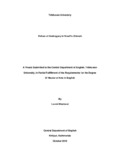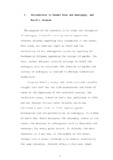Please use this identifier to cite or link to this item:
https://elibrary.tucl.edu.np/handle/123456789/2921Full metadata record
| DC Field | Value | Language |
|---|---|---|
| dc.contributor.author | Bhattarai, Laxmi | |
| dc.date.accessioned | 2021-03-01T09:44:00Z | |
| dc.date.accessioned | 2021-07-23T04:23:18Z | - |
| dc.date.available | 2021-03-01T09:44:00Z | |
| dc.date.available | 2021-07-23T04:23:18Z | - |
| dc.date.issued | 2012-10 | |
| dc.identifier.uri | http://elibrary.tucl.edu.np/handle/123456789/2921 | - |
| dc.description.abstract | Critics like Michael Rosenthal agree that Orlando offers a fictional ideal embodiment of the androgyny that Woolf exalts in A Room of One’s Own. However, this research argues that Woolf actually relies on stereotypical gender differences to critique the pitfalls of gender and sexual conditioning in Orlando, which reveals Woolf’s serious doubt about the potentiality of her own proposed state of androgyny. Orlando is unable to reach the ideal state of mental androgyny that Woolf exalts in A Room of One’s Own because of cultural and social conditioning. Pressures and expectations, both inner and outer, prevent Orlando from developing the androgynous mind that Woolf idealizes in A Room of One’s Own. In Orlando, Woolf does not depict an ideal androgyny but actually shows why androgyny is impossible | en_US |
| dc.language.iso | en_US | en_US |
| dc.publisher | Faculty of Humanities and Social Sciences | en_US |
| dc.subject | Androgyny | en_US |
| dc.subject | Woolf's Orlando | en_US |
| dc.subject | Failure | en_US |
| dc.title | Failure of Androgyny in Woolf's Orlando | en_US |
| dc.type | Thesis | en_US |
| Appears in Collections: | English | |
Files in This Item:
| File | Description | Size | Format | |
|---|---|---|---|---|
| cover.pdf | 359.05 kB | Adobe PDF |  View/Open | |
| chapter.pdf | 353.88 kB | Adobe PDF |  View/Open |
Items in DSpace are protected by copyright, with all rights reserved, unless otherwise indicated.
